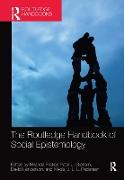Edited by an international team of leading scholars, The Routledge Handbook of Social Epistemology is the first major reference work devoted to this growing field. The Handbook's 46 chapters, all appearing in print here for the first time, and written by philosophers and social theorists from around the world, are organized into eight main parts:
Historical Backgrounds
The Epistemology of Testimony
Disagreement, Diversity, and Relativism
Science and Social Epistemology
The Epistemology of Groups
Feminist Epistemology
The Epistemology of Democracy
Further Horizons for Social Epistemology
With lists of references after each chapter and a comprehensive index, this volume will prove to be the definitive guide to the burgeoning interdisciplinary field of social epistemology.


